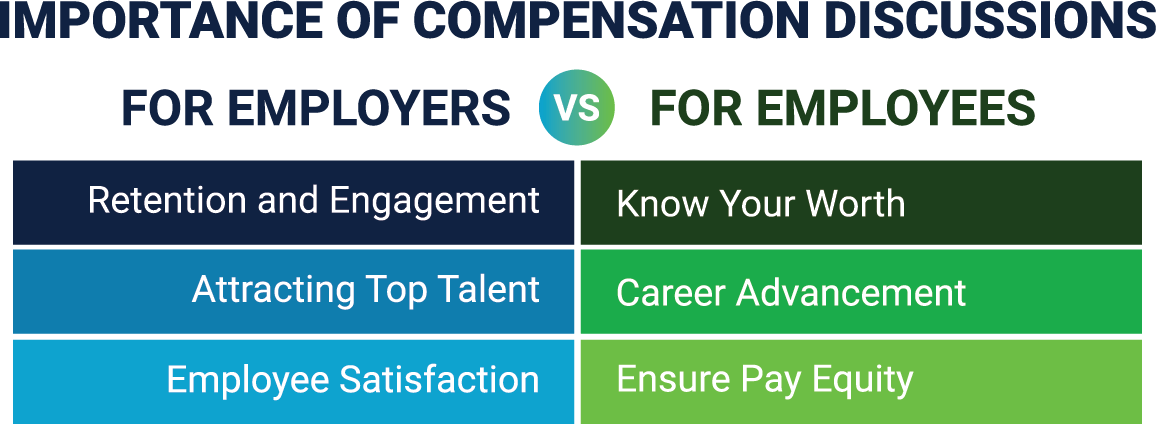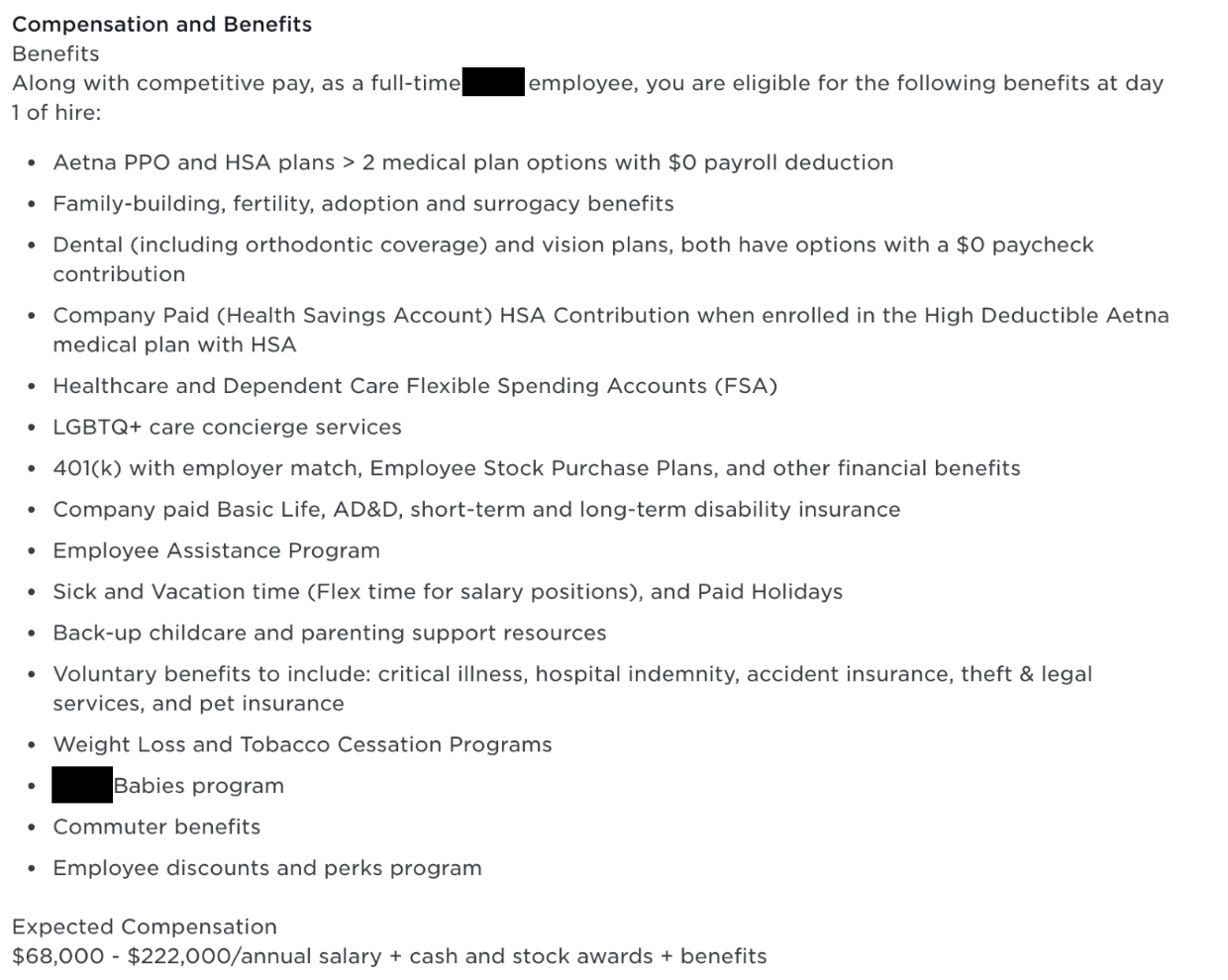How to Talk about Compensation
Compensation discussions with employees are crucial to fostering a positive work environment and retaining top talent. Employees appreciate open and transparent conversations about their compensation and how it aligns with their skills and contributions to the organization. In the past, pay transparency was an uncomfortable topic and something not often discussed. It was common practice to keep salary information a secret to avoid any workplace jealousy and tension. However, in the modern workforce, having an open compensation conversation has become more common. It can be a crucial step in the process of comparing current salaries with market rates and resolving pay inequity issues.
IMPORTANCE OF COMPENSATION DISCUSSIONS FOR BOTH EMPLOYERS AND EMPLOYEES
Compensation conversations serve as a bridge between employees and their employers. These discussions are more than just about numbers; they symbolize an organization's commitment to recognizing and rewarding the efforts of its workforce.
Why are compensation discussions essential for employers?
- Retention and Engagement – Open discussions about compensation help boost employee engagement and commitment. When employees understand how their pay is determined and feel comfortable having a compensation discussion, they are more likely to stay with the organization.
- Attracting Top Talent – A reputation for fair compensation discussions can attract high-caliber candidates. Potential employees want to work for organizations that value and compensate employees for their contributions adequately. For instance, California recently passed a law that requires companies with 15 or more employees to include the pay scale for a position in any job posting so that potential employees can align the salary with the job.
- Employee Satisfaction – Satisfied employees are more productive and committed. Fair compensation discussions foster trust and employee satisfaction. If employees see the potential of a salary increase, then they tend to be more productive and reach for career advancement. A satisfied and motivated employee will help bring more business and grow the company.
Why are compensation discussions essential for employees?
- Know Your Worth – Having an open compensation discussion with your manager will help you align your salary with your skills. Your skills and knowledge grow over time, and it is important that your salary accurately reflects your growth.
- Career Advancement – When you have a clear understanding of a company’s compensation package, you will know how to advance your career to earn a higher salary.
- Ensure Pay Equity – Having an open conversation about compensation can help minimize any pay inequity issues, such as the gender pay gap. An employee should not earn less than another individual with the same job title, experience, and education.

BEST PRACTICES FOR EMPLOYERS IN COMPENSATION DISCUSSIONS
It can be difficult to have an open compensation conversation with your employee. Here are some steps that can make sure this conversation goes smoothly:
- Be Prepared – Before you engage in compensation discussions, preparation is key.
- Research Compensation Benchmarks: Use reliable resources, such as the Assessor Platform, to gather market data and benchmarks for your industry and region. This data will help ensure that your compensation offers are competitive.
- Review Employee Performance: Understand each employee’s overall performance, including contributions, achievements, and areas for future improvement. A detailed performance evaluation is essential for determining appropriate compensation.
- Clear Communication – Effective communication is crucial in a successful compensation discussion.
-
- Set Clear Objectives: Define the purpose and goals of the discussion. Let your employees know why they are having this conversation and what to expect beforehand so that they are also prepared.
- Use Simple Language: Although you are a compensation professional, try to avoid jargon and complicated terms that employees may not understand. Explain the compensation components and calculations in simple terms to avoid any confusion.
- Listen Actively: Give employees the opportunity to voice their concerns, expectations, and questions. Actively listen and address their feedback.
- Be Fair and Consistent – Be consistent and avoid any favoritism or bias to promote a positive work environment. Ensure that your compensation decisions are based on objective criteria, such as performance, experience, and market data.
- Present a Comprehensive Package – Compensation is not just about salaries. Discuss all components of the compensation package, including benefits, bonuses, stock options, and cost-of-living adjustments. Show how each element contributes to the total value of the employee’s compensation.
DISCUSSING THE TOTAL COMPENSATION PACKAGE
When talking to your employees about their total compensation package, consider all forms of compensation that an employee receives in exchange for work. Total compensation expectations include not only base pay, but also the employer-paid costs of benefits, such as medical, dental, vision, 401(k) matching contributions, life insurance policies, holidays, paid time off, bonuses, and more. Several factors to take note of when explaining total compensation follow:
- Base Salary
- Market Data: Companies use market data to determine the industry and regional salary benchmarks. This information helps ensure that base salaries are competitive.
- Performance-Based Increases: Consider tying base salary increases to individual performance. High-performing employees may receive higher salary raises.
- Bonuses and Incentives
- Performance Metrics: Clearly define the performance metrics that will trigger bonuses or incentives. Ensure that these metrics are realistic and attainable.
- Link to Goals: Align bonuses and incentives with the achievement of individual or team goals. This approach reinforces the connection between performance and compensation.
- Benefits and Perks
- Health and Retirement Benefits: Explain the company's contributions to health insurance, retirement plans, and other benefits. Discuss how these contributions impact an employee's overall compensation.
- Non-Monetary Perks: Address non-monetary rewards, such as flexible work schedules, professional development opportunities, or wellness programs. These can add significant value to an employee's compensation package.
The components of a total compensation package may vary depending on the organization’s goals and budget. A job posting example below (with the company name blurred for confidentiality) includes cash and stock awards, bonuses, and various benefits, such as employee discounts, childcare support, commuter benefits, and more, in addition to the base salary. With all of this added, an employee can have a salary expectation of $68,000 to $222,000 in annual salary, plus cash and stock awards and benefits.

Once you figure out the total compensation for each job, compile a report with a simple breakdown of all the components, including wages, benefits, non-monetary perks, etc., for each employee. It is beneficial to explain all components of a total compensation package, not just the base salary. This report should be understood easily by someone without a background in compensation.
COMMUNICATING COMPENSATION TO EMPLOYEES
Here is an approach to successful compensation conversations as an employer:
- Timing – Let your employees know when the right time for compensation discussions is. Depending on your industry, discussions about salaries usually happen during annual reviews, promotion discussions, job changes, or performance evaluations.
- Keep the Conversation Open – Start the discussion with an open and welcoming tone. Express your willingness to listen to the employee's thoughts and concerns.
- Provide Context – Offer context by explaining the organization's compensation policy and how it aligns with market data and industry standards. This helps employees understand that their pay is not arbitrary.
- Be Patient and Empathetic – Compensation discussions can be emotional. Employees may have different expectations or financial needs. Listen to their concerns and approach the conversation with empathy.
- Address Questions and Concerns – Invite employees to ask questions and share their concerns. Address each question with honesty and clarity. If you do not have an immediate answer, commit to finding one and following up on the discussion. Here are some questions you can ask as an employer to guide the conversation:
- How do you like your current position?
- Do you feel you are being paid a fair rate for your position, experience, and education?
- What job title or position would you like next?
- Do you know the average salaries or pay ranges for people in your field?
- Are you ready to take on more training or learn new skills to position yourself for a potential promotion or raise?
- Focus on the Future – Discuss opportunities for growth and advancement. Explain how employees can increase their compensation through skill development, promotions, or achieving specific performance goals.
DISCUSSING COMPENSATION WITH EMPLOYERS
Now that we have covered best practices for compensation professionals, it is time to discuss how you as an employee can prepare for compensation discussions with your manager. Consider these suggestions for how to discuss salary expectations with your manager.
- Be Prepared – Before you engage in compensation discussions, preparation is key.
- Research Average Salaries: It is important to research the average salary for your job title in your industry, factoring in your experience and education. Evaluate how those average salaries compare to your situation as you establish your compensation expectations. This will help you more effectively negotiate for fair and competitive pay. Use our salary calculator to easily determine how much you should be getting paid.
- Be Specific: You can give employers your desired salary range but, if you provide a specific amount, you are more likely to get the amount you are expecting.
- Evaluate Your Performance: Review your performance and keep track of all your accomplished tasks. Keep in mind both the tasks that are in your job description and those that exceed your job description. Tasks done outside your job description can be negotiated for a promotion or another compensation reward.
- Clear Communication: Whether it is asking for a promotion or negotiating a higher salary, have a clear goal and objective.
- Timing – Ask your employer early about the best time to talk about salary adjustments. Employers usually discuss salaries during annual reviews but, by that time, employers will already have decided on raises. Timing your compensation discussion appropriately may help you improve your performance, ask for a compensation adjustment, and hopefully see it implemented within the annual review cycle.
- Have Responses Prepared – A compensation discussion is not simply asking for a higher salary. If employers are unable to meet your needs, then be prepared with questions on how to improve and earn your desired salary. Here are some questions that you can ask:
-
- What do I need to do to earn the salary I desire?
- When is a suitable time to review my salary and performance?
- What standards do you use to set compensation?
- Are my career goals possible at this company?
WHY USE SALARYEXPERT’S SALARY SURVEY DATA?
Effective compensation discussions with employees are pivotal for attracting, retaining, and motivating top talent. Compensation professionals can enhance their skills by adhering to best practices, using market data and benchmarks from reliable sources and leveraging compensation planning software. SalaryExpert, powered by ERI, was launched in 2000 with a mission to provide employers, human resource professionals, and job seekers with comprehensive compensation data. Backed by over 30 years of verified and reliable salary data, SalaryExpert draws on ERI’s expertise in salary and cost-of-living data to provide reliable tools for evaluating career, relocation, compensation, and education decisions. We want to make your compensation planning and career evaluation easier with access to salary survey data for more than 10,400 locations, 1,100 industries, and 16,000 jobs, including 1,300 executive positions.
